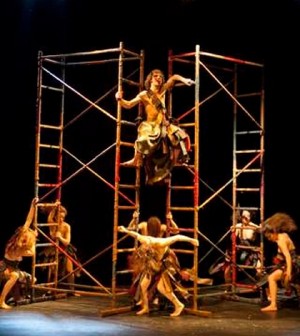- April Fair in Seville 2024. From 14 to the 20 April
- The Cirque del Sol returns to Seville with 'Alegría'. 2024
- List of Booths April Fair
- Valentine menu Sevilla | Valentine dinner Sevilla | Valentine Romantic Dinner
- Christmas Mapping ‘Navigalia’ will illuminate Seville in 2023
- Itinerary, Tour schedule and the Cavalcade of the Magi from Sevilla 2024
- Christmas Menus in Seville
- List of Booths April Fair 2023
- Check out the itineraries of the Holy Week in Seville 2024. From 24 to the 31 March.
- Kooza: The best images of Cirque du Soleil in Seville
“The Bacchae” Italica
Did you found interesting?

31 July, 01 and 02 August 2014
Roman theater of Italica
22:30 h.
Ticket Price: 15€. Discounts: 12€
Euripides (480 a. C. – 406a.C.) was one of the three great Greek tragic poets of antiquity, along with Aeschylus and Sophocles. Euripides is the most modern of the tragic and the Bacchae perhaps the quintessential tragedy, a sublime aesthetic and impeccable. The character, intelligence, irony and so many other things that adorned the playwright made the work transcend from start to finish. Dionisos, God gives the greatest joys and sufferings worse, has arrived at the gates of Thebes, to where I was conceived, that created the nato ni. It has decided to punish the city where his mother was labeled a liar and that his divinity was questioned. This is the prologue of The Bacchae: a dismal future ahead for the Theban royal house .
About this myth, and the development of this, the tragedy is built, Euripides and imparts a masterful depth. Use antagonistic dual aspects both characters and plot; There is nothing more tragic than this relativism, it leaves man without absolute truths and to an inevitable fate. So Pentheus, faithful representative of the Apollonian thought (thinking secondary, under the command of reason and oppressive, where ideology is prevailing), is the rigid guardian of the laws, their curricula, with immigration laws and all that, yet falls prey to its pathos (their primary drives, their fears and passions).
Thus Dionysus is both the beautiful god who offers the most extensive happiness and the terrible avenger, capable of the most hideous. Thus also the speeches about the Dionysian (primary way of thinking, under the orders of the senses and redemptive) Apollonian and mixed, showing equal or valid and understandable. The exhortation of the Bacchae is clearly aimed at the women of Thebes. The feminine element is always present in the Dionysian. Dionysus is sensitive to the oppression of women. It is Dionysus who liberated women from the drudgery, servitude. But he also wants to free men from bondage and restore freedom of nature. Want to liberate the people of Thebes from the oppressions to which they are subjected. The cause of oppression, its principal symbol, is the tyrant Pentheus. The Bacchae, remember, propagandize the god of Thebes in the streets and invite to dance in the bush. What they propose is an escape from the city to nature. There on the mountain, this wild dance les lead al ecstasy, one being "out of it", release. The desire to escape to idyllic places, leaving the city, is constantly repeated by the chorus of maenads. For what is idyllic pleasure: freedom. Dionysus is part of the physis, Nature, and governed by divine laws unwritten, post is an apology of nature and wants to destroy the convention which imprisons man, making it back to a natural state, with consequent release of the individual.
The Bacchae of Euripides, by expert dialogue, its extreme and shocking situations, analysis of irrational sentiment and, especially their analysis of human duality is considered one of the best ever written tragedies.
The Bacchae TODAY, a song of freedom
Frente al symmetrical Penteo, defender of order, rationalism and repression, emerge triumph of Dionysus, Bacchus: change, creativity, instinct, feelings, Passion, love, poetry, wine, Joy, SEX, Music, dreams, the subconscious, equality, freedom. Dionisos, with its imperfections and passions, defects and contradictions is the human being. Dionisos, the god child of God, are we.
The intense and emotional and philosophical text of Euripides load we added various paraphrases of excerpts from the works of Artaud, Snub, Kierkegard, Isaias y Kundera. All, Man purposely, the spirit, Body, Life happens at the death. Divided into chants, instead of scenes, our proposal that aims to be: one CANTO. Song of Freedom, ode to the duality, singing to the earth, ode to nature, love song, Singing for peace, ode to joy, song to the new song to life. We are ALL HEART, LATIMOS everywhere. Everything alive is crying: "While we spend our energies in fruitless discussions looking for a hidden meaning, an immense clamor shakes things: Give us new ways!"In the meantime, spreads hopelessly, today more alive than ever, PURE CRY, SINCERE, EMANCIPADOR AND WILD WOMEN OF THE FREE: ¡EVOÍ!











